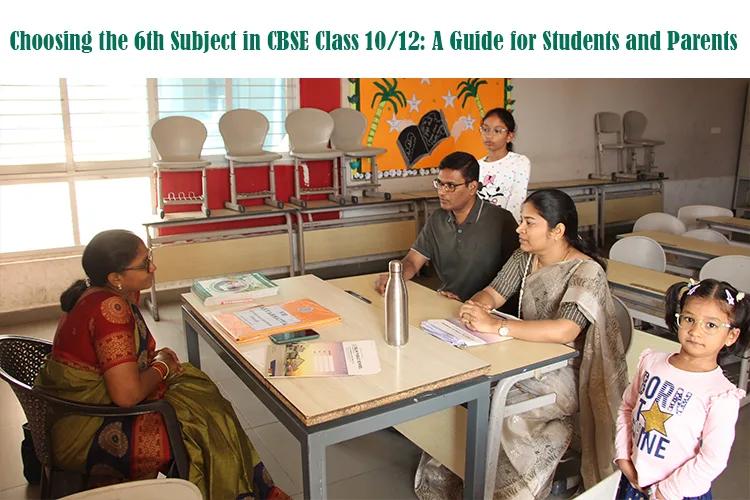The decision to select a sixth subject in CBSE Classes 10 and 12 leaves parents and students wondering about its necessity and impact. This choice influences your child’s academic journey and future opportunities. Many times this subject adds career opportunities for your ward to pursue after higher secondary. Let us walk you through the aspects of this decision to help parents make an informed choice.
Understanding the sixth subject option
The CBSE curriculum needs students to study five core subjects. However, the board allows students to take an extra sixth subject, which is either academic or vocational to provide students with learning opportunities. Through this blog parents will also understand why it serves as a strategic academic tool.
The sixth subject is chosen from various streams including academic subjects like Psychology, Legal Studies, or Applied Mathematics, vocational subjects such as Artificial Intelligence, Data Science, or Retail Management, and creative subjects like Fine Arts or Mass Media Studies.
The replacement rule: a safety net
The advantage of choosing a sixth subject is the replacement provision. If your child fails in one of the five core subjects but passes the sixth subject, CBSE allows the sixth subject to replace the failed subject during final result calculation. This rule applies under specific conditions:
- The sixth subject must be eligible for replacement according to CBSE guidelines.
- Language subjects cannot be replaced unless another language is taken as the sixth subject.
- The replacement is done only if it improves the overall percentage, following the “best of five” rule.
This provision gives students additional security during board examinations.
Academic and strategic benefits
- Percentage Improvement: The “best of five” rule means your child’s final percentage is calculated using their five highest-scoring subjects. If the sixth subject score is higher than one of the core subjects, it improves the overall percentage.
- Career Alignment: Students choose subjects that add to their intended career path. For example, a student interested in psychology takes it as a sixth subject to gain early exposure to the field.
- Skill Development: Vocational subjects provide practical skills valuable in today’s job market. Subjects like Computer Applications, Entrepreneurship, or Financial Literacy come with practical learning experiences.
- Competitive Exam Preparation: Some sixth subjects directly support preparation for competitive exams. Applied Mathematics, for example, is beneficial for engineering aspirants.
Important considerations
- Increased Workload: Taking a sixth subject means additional study time, assignments, and examination preparation. Students must manage this extra workload alongside their core subjects and other activities.
- Financial Implications: Some subjects require more materials, software, or equipment. Art subjects need supplies, while computer-related subjects require software access.
- School Availability: Not all schools offer the same range of sixth subjects. Check with your school about available options and their quality of instruction.
- Time Management: Students involved in competitive exam preparation or extracurricular activities need to carefully consider if they handle the additional academic load.
Popular sixth subject choices
- Academic Subjects: Psychology appeals to students interested in human behavior and mental processes. Legal Studies provides foundation knowledge for law careers. Applied Mathematics supports engineering and technology aspirations.
- Vocational Subjects: Artificial Intelligence and Data Science are increasingly popular given the growing tech industry. Entrepreneurship develops business acumen and innovation skills. Fashion Studies and Mass Media cater to creative career paths.
- Language Subjects: Additional languages like French, German, or Sanskrit are valuable for global career opportunities or cultural interest.
Making the right choice
When selecting a sixth subject, consider your child’s interests and natural aptitudes. A student who enjoys reading and writing gravitates toward subjects like Legal Studies or Psychology. Those with analytical minds prefer Applied Mathematics or Computer Science.
Evaluate how the subject aligns with future career goals. If your child is considering commerce or business, subjects like Entrepreneurship or Financial Literacy would be beneficial. For those leaning toward creative fields, subjects like Fine Arts or Mass Media would be appropriate.
Consider your child’s current academic performance and capacity to handle additional workload. Students who are already struggling with core subjects should think carefully before taking on a sixth subject.
Examination and assessment
The sixth subject follows the same examination pattern as other CBSE subjects, with board examinations conducted annually. Students must appear for both theory and practical examinations where applicable.
If a student fails in both a core subject and the sixth subject, they must appear for compartment examinations in both subjects. However, if they pass the sixth subject, it replaces the failed core subject under the replacement rule.
Making an informed decision
The choice of a sixth subject should be made after careful consideration of your child’s academic abilities, interests, and future goals. While it offers advantages, it also requires additional commitment and effort.
Discuss with your child about their interests and comfort level with increased academic responsibility. Consider their current academic performance and ability to manage additional subjects. Evaluate the long-term benefits against the immediate challenges.
At DPS Warangal, students and parents are provided with guidance and counselling to make these decisions wisely. Teachers help students understand how different subject choices align with future career aspirations, academic strengths, and personal interests. With a wide range of sixth subject options both academic and vocational. DPS Warangal ensures flexibility for every learner’s path.
The sixth subject option in CBSE is a valuable opportunity that provides academic flexibility and career preparation. When chosen thoughtfully, it benefits your child’s educational journey and future prospects. The key is to make an informed decision that aligns with your child’s capabilities and aspirations while considering the practical aspects of implementation.


